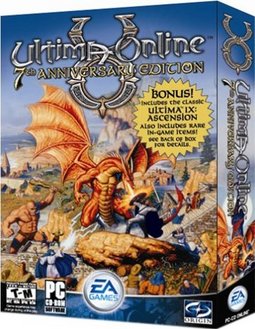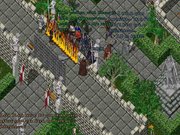Ultima Online
Released on September 30, 1997, by Origin Systems, Ultima Online (UO) is often considered the first popular massively multiplayer online game. The game is played online, in a fantasy setting similar to that of the other Ultima games that preceded it. more...
Overview
The success of Ultima Online (UO) opened the door for the creation of many exciting new massively multiplayer games that have or are about to hit the market. UO is a third-person/isometric fantasy role-playing game set in the Ultima universe. It is online-only and played by thousands of simultaneous users (who pay a monthly fee) on various game servers, also known as "shards." It is also known for its extensive timing-based player versus player combat system. There have been millions of subscribers. To maintain order in the online community, there are Game Masters who resolve player disputes, police the shard for terms of service violations, and correct glitches in the game.
Several expansions have been released, but its aging game engine and graphics make it fairly outdated compared to competitive, new massively multiplayer games. Since the release of Ultima Online: Age of Shadows expansion, many veteran players have all but removed themselves from the game to either try new MMORPGs, free shards, or quit entirely. Since Ultima Online's prime in the early 2000's, overall subscriber turnout has been dramatically dropping. Subscriber numbers peaked at around 250,000 in July of 2003, and have steadily declined to around 160,000-175,000 subscribers (Subscriber counts source Mmogchart.com). The number of subscribers achieved by UO was surpassed by EverQuest in 1999.
Issues Faced
Ultima Online has seen many major revisions throughout its history. This includes game-play revisions, staff changes, technical revamps, and even fundamental design changes. With few earlier MMORPGs to take lesson from, the staff behind UO was breaking new ground and had to solve complex issues that had never been faced in a commercial game on such a wide scale before. The importance of understanding psychology, social interaction, economy, and such became increasingly important as complex social behavior evolved.
Throughout the pre-release development of the game, a well-balanced, realistic economy and social structure was the goal. While not nearly all of the features planned for incorporation made it into the first release, the developers did manage to put almost all of the control into the hands of players in terms of what they could do to each other and the world as a whole. What ensued caused permanent repercussions still faced in the game today.
Griefing
Many players saw the “punch in the nose factor” (as Designer Dragon put it) of being able to harm each other directly as allowing too much “griefing” – or intentionally hampering the entertainment of others. Originally unrestrained in nature (except in the presence of guards), increasing penalties were applied to “anti-social behavior” until it was practically eliminated altogether with the release of Trammel – a world in which mutual-consent was necessary to harm another. While the warrants of eliminating un-consented player versus player combat are debatable, almost all subsequently released MMORPGs started off right away with only mutual-consent combat amongst players, which attracted many players away from UO before Trammel was introduced. Many more players left in subsequent years, often marking the introduction of Trammel as the turning point, claiming the ability to avoid the more complex sides of interaction took much of the spice away from the game.
Housing
Another problem was that of player-owned housing. UO has always allowed players to purchase houses, and build them on practically any flat piece of land. For the first few months, the primary issues with housing were that losing the key meant losing the house (often to another player who stole it or killed the owner), and if someone managed to get inside the house (either by exploitation of a bug or by simply waiting until someone opened/unlocked the door), they could steal everything inside. These issues were later addressed by making house keys “blessed” (non-stealable, non-droppable upon death) items, and by giving special commands to “lock down” items, so that even those who got in the house could not pick them up. Ownership of a house was also eventually defined separately from mere key possession.
After a few months, when some players and guilds had enough money to buy many houses, there came the problem of using tents and other cheap houses to wall off huge sections of the world as private areas. It was a common solution to the above problems (before they were fixed), if you owned a large house like a tower, to build three smaller houses around the entrance, walling you in, and then using the recall or gate spell to get inside that artificial courtyard. Since some players abused that tactic to create gigantic “courtyards”, the developers eventually opened up all of the major ones by deleting selected houses and by putting the additional restraint on house placement rules requiring that there be empty space around a building before it may be placed.
By the time Trammel was introduced, there was literally not a single empty space of land anywhere in the game where a house of any size could be built. Vast amounts of wilderness were covered with a thick layer of housing, making places supposedly “wild” seem like cities. When housing was enabled on Trammel, tens of thousands of players simultaneously camped out and tried to compete for prime locations for various types of houses, resulting in massive amounts of telestorming, where players were transferred amongst the sub-servers of a given shard, causing random teleportation and extreme amounts of lag. For many years, housing space was scarce, due in part to rising numbers of subscribers and only slowly increasing limitations on the number of houses each account may own. Several worlds were created without the ability to have houses built within them to protect their atmosphere from becoming another city. Almost all house transactions during this time were of currently-owned houses being sold, or people waiting outside houses that are about to “decay” (disappear from lack of use) – even though housing is limited to one house per player. In recent years, additional housing areas have been made available for all players. Many subsequent MMORPGs used instancing for housing or simply did not provide it at all.
Read more at Wikipedia.org




